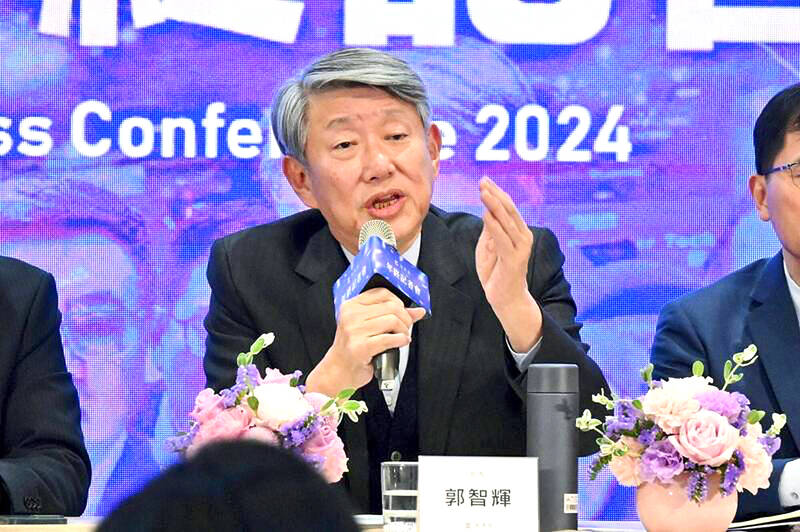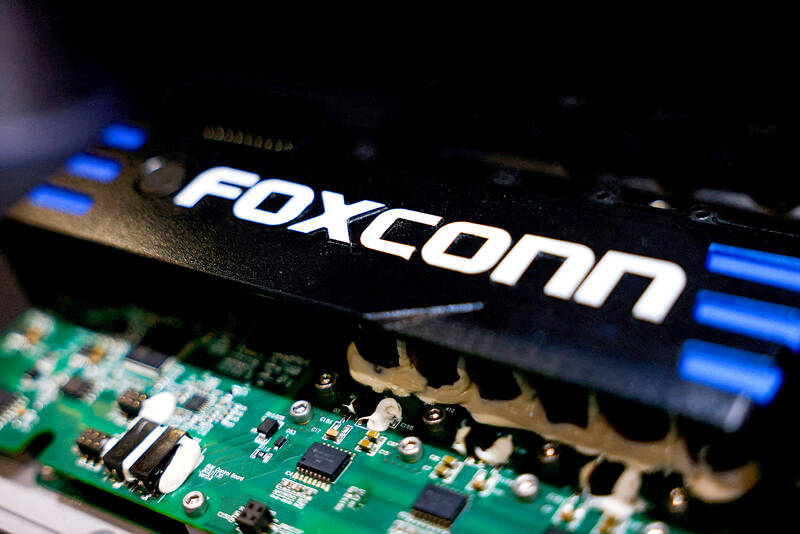The government pledged to help companies with operations in Mexico, such as iPhone assembler Hon Hai Precision Industry Co (鴻海精密), also known as Foxconn Technology Group (富士康科技集團), shift production lines and investment if needed to deal with higher US tariffs.
The Ministry of Economic Affairs yesterday announced measures to help local firms cope with the US tariff increases on Canada, Mexico, China and other potential areas.
The ministry said that it would establish an investment and trade service center in the US to help Taiwanese firms assess the investment environment in different US states, plan supply chain relocation strategies and connect with local partners.

Photo: Liao Chia-ning, Taipei Times
It said it would provide information and insights on target markets for Taiwanese companies that are mulling setting up factories in the US or relocating to Southeast Asia or India.
Additionally, the ministry said it would help businesses shift their attention to local demand, and provide legal guidance and assistance in finding local partners.
The ministry in a statement released on Sunday said that it would help firms deal with potential supply disruptions, after US President Donald Trump signed orders imposing tariffs of 25 percent on imports from neighboring Canada and Mexico.

Photo: Ann Wang, Reuters
Taiwanese firms such as Hon Hai are integrated into the global electronics production chain by assembling servers and gadgets for most of the world’s biggest tech companies. Many Taiwanese companies also manufacture artificial intelligence (AI) servers or make parts for those devices in Mexico to be closer to the US market.
Foxconn last year said it was building the world’s largest assembly site for servers powered by Nvidia Corp’s GB200 chips in Mexico.
Other Taiwanese partners of Nvidia include Inventec Corp (英業達), which also operates plants in Mexico.
Foxconn shares fell 9.2 percent in Taipei, while Inventec shares slumped 8.5 percent — their biggest daily decline since August last year.
“We might organize delegations to attend SelectUSA events and help Taiwanese companies secure support from the local government when they increase their investments in the US to create a win-win business model for US and Taiwanese supply chains,” the ministry said in a texted statement late on Sunday.
Taiwan’s investments in Mexico would have reached US$4 billion by the end of this year, according to the Taipei Economic and Cultural Office in Mexico.
Taiwanese companies have employed about 70,000 people in the country since 1999.
After Trump’s election in November last year, Foxconn and Taiwanese peer Quanta Computer Inc (廣達電腦) increased their investments in the US. Foxconn has secured land in California, Wisconsin and Texas, while Quanta’s board approved a US$230 million capital increase for its US unit.
More than 300 Taiwanese companies have factories in Mexico, government data show.
Additional reporting by Crystal Hsu

Taiwan Semiconductor Manufacturing Co (TSMC, 台積電) would not produce its most advanced technologies in the US next year, Minister of Economic Affairs J.W. Kuo (郭智輝) said yesterday. Kuo made the comment during an appearance at the legislature, hours after the chipmaker announced that it would invest an additional US$100 billion to expand its manufacturing operations in the US. Asked by Taiwan People’s Party Legislator-at-large Chang Chi-kai (張啟楷) if TSMC would allow its most advanced technologies, the yet-to-be-released 2-nanometer and 1.6-nanometer processes, to go to the US in the near term, Kuo denied it. TSMC recently opened its first US factory, which produces 4-nanometer

PROTECTION: The investigation, which takes aim at exporters such as Canada, Germany and Brazil, came days after Trump unveiled tariff hikes on steel and aluminum products US President Donald Trump on Saturday ordered a probe into potential tariffs on lumber imports — a move threatening to stoke trade tensions — while also pushing for a domestic supply boost. Trump signed an executive order instructing US Secretary of Commerce Howard Lutnick to begin an investigation “to determine the effects on the national security of imports of timber, lumber and their derivative products.” The study might result in new tariffs being imposed, which would pile on top of existing levies. The investigation takes aim at exporters like Canada, Germany and Brazil, with White House officials earlier accusing these economies of

GREAT SUCCESS: Republican Senator Todd Young expressed surprise at Trump’s comments and said he expects the administration to keep the program running US lawmakers who helped secure billions of dollars in subsidies for domestic semiconductor manufacturing rejected US President Donald Trump’s call to revoke the 2022 CHIPS and Science Act, signaling that any repeal effort in the US Congress would fall short. US Senate Minority Leader Chuck Schumer, who negotiated the law, on Wednesday said that Trump’s demand would fail, while a top Republican proponent, US Senator Todd Young, expressed surprise at the president’s comments and said he expects the administration to keep the program running. The CHIPS Act is “essential for America leading the world in tech, leading the world in AI [artificial

REACTIONS: While most analysts were positive about TSMC’s investment, one said the US expansion could disrupt the company’s supply-demand balance Taiwan Semiconductor Manufacturing Co’s (TSMC, 台積電) new US$100 billion investment in the US would exert a positive effect on the chipmaker’s revenue in the medium term on the back of booming artificial intelligence (AI) chip demand from US chip designers, an International Data Corp (IDC) analyst said yesterday. “This is good for TSMC in terms of business expansion, as its major clients for advanced chips are US chip designers,” IDC senior semiconductor research manager Galen Zeng (曾冠瑋) said by telephone yesterday. “Besides, those US companies all consider supply chain resilience a business imperative,” Zeng said. That meant local supply would